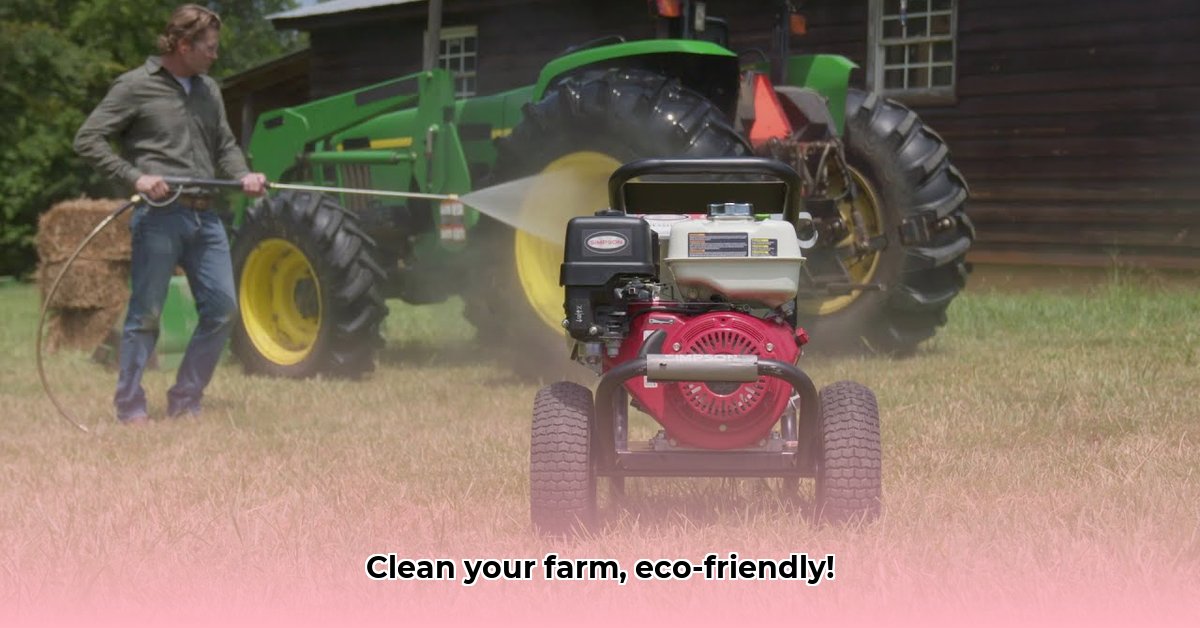
Choosing the right pressure washer can significantly impact your farm's sustainability. This guide provides actionable steps for selecting, using, and maintaining a pressure washer from Tractor Supply, while minimizing environmental impact. We'll cover everything from choosing the right model to exploring eco-friendly cleaning alternatives. For more on Tractor Supply equipment, check out this helpful resource.
Choosing Your Tractor Supply Pressure Washer: Power, Pressure, and Purpose
The ideal pressure washer depends on your farm's size and cleaning needs. Tractor Supply offers a range of options, from compact electric models to powerful gas-powered units. Let's examine the key factors to consider:
Power Source: Electric vs. Gas
Electric Pressure Washers: These offer quieter operation, lower emissions, and simpler maintenance. They're best for lighter cleaning tasks like smaller equipment and quick cleanups. However, their cleaning power is generally lower than gas models.
Gas Pressure Washers: These provide significantly more cleaning power, ideal for heavy-duty cleaning of barns, tractors, and large equipment. However, they are louder, require more maintenance (oil changes, fuel), and generate exhaust fumes.
Pressure (PSI) and Flow Rate (GPM): Balancing Power and Water Usage
PSI (Pounds per Square Inch): This measures the cleaning power. Higher PSI means more cleaning power, but excessive PSI can damage surfaces.
GPM (Gallons per Minute): This indicates the water flow rate. Higher GPM means faster cleaning but increases water consumption. Find a balance that matches your needs without excessive water waste.
Nozzle Types: The Right Tool for Every Task
Different nozzles create different spray patterns. A multi-purpose nozzle is great for general cleaning, while a pencil jet nozzle is best for precise cleaning of stubborn stains or hard-to-reach areas.
Here's a comparison table to help you choose (note: models and prices vary; check your local Tractor Supply for current offerings):
| Model Type (Example - Check Tractor Supply for Current Offerings) | Power Source | Approximate PSI | Approximate GPM | Best Suited For | Approximate Price Range |
|---|---|---|---|---|---|
| Compact Electric Pressure Washer | Electric | 1800-2200 | 1.5-2.0 | Light-duty cleaning, small tools | $100-$250 |
| Mid-Range Electric Pressure Washer | Electric | 2000-2500 | 2.0-2.5 | General farm equipment cleaning | $200-$400 |
| Heavy-Duty Gas Pressure Washer | Gas | 2500-3000+ | 2.5-3.0+ | Heavy-duty cleaning, barns, large equipment | $300-$600+ |
Sustainable Pressure Washing Techniques: Cleaning Responsibly
Efficient and environmentally friendly pressure washing relies on proper technique. Let’s look at some essential steps:
Pre-soaking: Pre-soak surfaces with water to loosen dirt, reducing the time (and water) needed for high-pressure cleaning. This simple step can significantly improve efficiency.
Nozzle Selection: Use the appropriate nozzle for the task. A fan-tip nozzle is often more efficient for larger areas, while a pencil jet nozzle is useful for detailed cleaning.
Targeted Cleaning: Focus on the dirtiest areas. Avoid unnecessary pressure washing of already clean surfaces. This helps save water and energy.
Water Conservation: Aim to minimize water usage. Consider collecting wastewater for reuse where appropriate (e.g., for irrigation in non-potable applications). Don't forget proper disposal.
Biodegradable Cleaning Solutions: Use environmentally friendly cleaning products whenever possible. Many are available at Tractor Supply and other farm supply stores.
Responsible Disposal: Dispose of wastewater and cleaning solutions according to local regulations. Never discharge them into waterways or onto the land.
Maintaining Your Pressure Washer: Extending Lifespan and Efficiency
Regular maintenance is crucial for extending the life of your pressure washer and maintaining its efficiency. This also prevents unexpected repairs and downtime.
Cleaning: Rinse the entire machine after each use to prevent dirt and debris buildup.
Winterizing (if applicable): Drain the system completely before winter storage in cold climates to prevent damage from freezing.
Storage: Store your pressure washer in a dry, sheltered area to protect it from the elements and prevent corrosion. Proper storage prevents unnecessary damage and increases the lifespan of your machine.
Exploring Alternatives: Eco-Friendly Cleaning Methods
While pressure washers are invaluable, they are not always the best solution. Consider these eco-friendly alternatives:
Manual Cleaning: For smaller tasks or delicate surfaces, manual cleaning with brushes, sponges, and biodegradable soap is a highly effective and environmentally friendly option.
Lower-Pressure Options: For less intensive cleaning needs, consider using a lower-pressure pressure washer. This reduces water consumption without compromising cleaning effectiveness.
By following these guidelines, you can use your Tractor Supply pressure washer effectively and responsibly, keeping your farm clean and protecting the environment. Remember, sustainable farming involves making thoughtful choices. Choosing and using your equipment wisely is a key element of that.